- Home
- Gregory Maguire
Confessions of an Ugly Stepsister Page 11
Confessions of an Ugly Stepsister Read online
Page 11
“Some changelings live to be old and broken,” says Iris. “I saw an ancient madman with no teeth and cheeks as smooth as a melon. He laughed high and foolishly like any changeling.”
“You beware your flighty mind!” says Margarethe. “It leads you astray into distracted moments, and then the devil will take you yet. Clara is no more a changeling than Ruth is.”
Iris doesn’t reply to this. She knows that though Ruth is huge, stupid, and inarticulate, she is herself and always has been. Iris can never know this of Clara, so the suspicion of a magical transformation will always linger, and can’t be proven wrong.
The winter months grind along at their glacial rate. Margarethe and her daughters haven’t returned to the Master’s house on the poor side of town. Henrika’s pregnancy is just too difficult. She doesn’t carry herself easily. She complains of mysterious ailments, over which the midwives cluck their tongues with confusion. Is Henrika carrying twins perhaps? Has there been a change in her diet? Is the business worry suffered by Cornelius van den Meer proving to be contagious? Gossip has it that a fiscal crisis in the van den Meer household would be devastating. Much of Henrika’s dowry has been advanced as collateral against business loans and would be lost.
Gossip also has it that there is a household demon living in the rafters of the attics, coming down only at dark, to gnaw at Henrika’s innards and ruin her health.
Henrika takes to her bed more and more often. Van den Meer attends her with loving affection when his work allows. There is worry—it can’t be kept hidden—about a missing ship that hasn’t arrived in port with its expected cargo. Van den Meer and his colleagues disagree about whether to send out an investigator to trace the route and hunt for news. News, good or bad, will come eventually, but is it smarter to know of a disaster earlier, and thus prepare for it? The longer the wait, the stronger the storms of winter will become.
Margarethe is a boon to the household. True, Henrika complains about the English look of the food that Margarethe brings and sometimes even spoons into Henrika’s mouth. Too salty, too savory, too foreign! “Always a remark,” says Margarethe calmly. “Eat up, for your health.” She knows that the queen bee of the household has little choice but to be grateful to the salaried chief of domestic affairs.
In the early part of winter Margarethe hangs the last of the herbs on strings about the kitchen and week by week, by Henrika’s special request, keeps a pot-au-feu on the hearth. The van den Meer household is much larger than any other Margarethe has lived in, and she takes to overseeing the cold room, the wine cellar, and whatever distant matters of barnyard life that the hired men in the outbuildings will sullenly cede to her.
So, Margarethe being kept busy with household affairs, it’s a time of liberation for the girls. Margarethe has no interest in sending the girls to school—well, Ruth can’t learn, and Iris is needed to govern Ruth!—and van den Meer is accustomed to leaving the supervision of Clara to his wife. Every morning, once the fast has been broken, and ablutions completed, and a few household tasks done, Iris and Ruth set out in their klompen to roam Haarlem and see what is to be seen.
Daily Iris and Ruth make their first stop at the Master’s studio, where Caspar pauses in his task of gessoing panels and stretching canvases, grinding pigments and applying varnishes. Daily he heats milk in a pan and adds to it flecks of bitter cocoa bean, drippings of honey, and small scoops of butter. Daily the Master roars at them for disturbing his peace and ruining his chance at a reputation. How is he to finish all the commissions he is getting, how, how, how?—but now the girls only giggle at him.
Ruth has little interest in painting. She’d rather sit in the kitchen and keep Caspar company. He sometimes carves faces out of potatoes to make her laugh. But Iris wanders into the studio and stands a safe distance away, since often her clothes are dripping with rain. She watches the inevitable brown beginnings of marks on canvas turn into the forms of human beings. She watches flesh tones consolidate. She watches heft emerge out of flatness. She hears the Master curse at his own mistakes with such language that Caspar rolls his eyes and sometimes puts his hands over Iris’s ears.
The Master moans with grateful distress. Every little domestic animal wants to be memorialized in paint! The very Holy Family itself is being displaced by sinful self-regard: portraits of how wealthy everyone has become! “But I have to eat, I can’t live by the word of God alone, no matter what Scripture says; I need bread too,” he says. “Damn the human stomach, this fat betrayer of my ideals. Caspar! Another Portrait of Madame Unlucky-in-Looks, done up to appear as Madame Most-Marvelous-to-Behold. I’m no longer telling the truth with my art, I’m lying. But I have to. How else can I afford that sumptuous cocoa you girls drink every morning of my life? And are you going to leave me any at all, or will I sip this thinning fluid by accident and keel over to an insensible end?”
He works quickly, with mounting confidence. Caspar is learning faster too and becoming a genuine apprentice. When the Master takes off at great speed to the outhouse in the alley, Iris and Caspar relish a small privacy.
One day Caspar reaches out as if to stroke Iris’s hair, and stops himself.
“Don’t you want to pick up a chalk and try for yourself?” he says.
“Of course I do, but I’m never going to be an apprentice, so why fool myself?”
“When I am the Master, you can be my apprentice,” says Caspar.
She laughs boldly at that. She hears the unfamiliar roll of her own chortling syllables—it stops her by its strangeness. And then she has to laugh all the more.
If Clara is growing older, then so too is Iris.
When the girls leave the studio, sometimes they wander through the Amsterdamse Poort to the meadow where Ruth gathered wildflowers. In the mornings the meadow is often still bleached with rimefrost, and Ruth seems puzzled that the flowers she was used to gathering are now no more than brittle brown stems. Still, the meadow is something of a haven for them. One day soon the cold may freeze all the canals over, and then, what a holiday! Better than kermis, Caspar promises, though they have no idea what kermis is. Carnival, he explains, before the hard season of Lent. Oh, Iris asks, is there a harder season than this?—but she can say such a thing now because she is not as unhappy as she once was.
With Henrika so often closed behind the bed drapes, Clara is listless and irksome. She’s glad when the girls come home. Before the fire one day, munching small bits of ham flavored with clove, Iris tells Clara, “If you came with us, you wouldn’t be so bored here.”
“I can’t go beyond the house, you know that,” says Clara. “Mama won’t allow it.”
“She’d never know! She’s not pacing the floorboards upstairs, peering out the windows!” says Iris. “She’s flat on her back!”
“I understand,” says Clara, “but all the same. It might get me.”
“Who?” says Iris, thinking of the imp.
“Dark wings at the top.” But Clara changes the subject herself now, adding briskly, “Before you were here, there was a woman from Flanders to teach me lace making. Before her, a woman from Paris who spoke to me in French. I had a man to teach me fingering on the keys of the virginal, and a man to train me in Scripture verses. Mama brings the world in to me. That’s all I can know.”
“It’s not your mama who keeps you here, not really,” says Iris. “I see it on your face. It’s yourself.”
“What do you say this for?” says Clara, lifting her chin with a pretense at bravery.
“You stand at the window and look up and down the street, but you can’t bring yourself to step a foot away from the door,” says Iris. She’s taunting Clara, but she doesn’t care this time. “You’re a coward.”
“I am not a coward.”
“Then come do it right now.”
“I won’t.”
Iris doesn’t want to be mean, but she hates the sameness of everything. “I know what we can do,” she says suddenly. “Ruth and I can put you in the wheelbarrow. We
can wheel you out the back gate. We won’t go into the marketplace, but away toward the banks of the canal. You can keep your eyes closed and not worry about a thing, and then you can open them up and you’ll have been carried by magic across the prison walls of your world. It won’t be your walking out. You won’t even see. We’ll be the ones who walk you out.”
“It sounds foolish,” says Clara.
“Let’s try it. Why not?” says Iris.
“You won’t dump me in the canal?”
“I promise,” says Iris. “That is, I promise to try not to.”
Clara gapes. But she has come to know how Iris teases, and suddenly she says, “All right. I’d like to see the canal. I can hardly even remember it.”
The wheelbarrow is in a corner of the kitchen yard. At the bottom are some old brown sacks. Clara and Iris snap the clots of soil and the bug carcasses off them. Iris looks up, somewhat guiltily, to see if their venturing out will be observed. There is no dark clot at the top window —just the sky rushing over the steeply pitched roof, a giddy early winter blue with stripes of innocent thin cloud. Nothing untoward.
Clara sits in the barrow like a princess in a palanquin. “No,” says Iris, “lie down, like you’re dead.”
“I don’t want to be dead,” says Clara.
“You won’t really be,” says Iris. “Pretend.”
Clara begins to be reluctant, but she does as Iris tells her.
“I’m going to cover you with these sacks,” says Iris. “Then even if your mother or anything should be looking out the window, she won’t see you.”
Clara sits up again. “Anything? What do you mean by that?”
But she allows herself to be urged back down. “It’s all right,” says Iris. “This’ll be fun.”
“Fun?” says Clara. Her voice is muffled.
“You know it will,” says Iris bossily.
“Don’t bump me,” says Clara. “Don’t put me in a place.”
“We won’t put you anywhere.” Iris shows Ruth how to pick up one handle of the wheelbarrow. Ruth is strong and picks up both. Iris then goes around and says, “I might as well ride on top of you. Am I squashing you?”
“You’re squashing me!”
“Forgive me, but I can’t hear you,” says Iris, “all those bags over your face—”
“You’re squashing me!”
“Let’s go, Ruth—”
They don’t even get the wheelbarrow through the gate when, Clara is sitting up, face red and purple. “Don’t squash me! I’m not going!” She pushes Iris with a strength born of an outsized anger. Ruth stands and gapes, her arms dropped at her side.
“Iris,” calls Margarethe from an upstairs window. “What are you doing?” Her voice is calm but low, insistent. “Come in at once and wait for me at the bottom of the stairs.” It is not a voice to be disobeyed.
Expecting punishment, they leave the wheelbarrow halfway through the gate and trudge inside. Margarethe’s unrushed tread is heard upstairs. The footsteps cross the hall—there’s a moan, then a louder moaning—and now the sound of footsteps on the back stairs, and now Margarethe turns into the kitchen. “There you are,” she says in an even voice. “Iris, I need you to run and fetch the midwife. I’m afraid that Henrika has taken a great pain, and at far too early a stage in the proceedings.”
“But I don’t know where the midwife lives!” says Iris.
“Use your brain and ask someone. I can’t leave the struggling mother alone.” Margarethe is standing with rare calm, not rushing back to attend to Henrika. “And I suppose you should run out to the Grotemarkt and ask who has seen Heer van den Meer.”
But Iris is reaching out to touch Clara on the shoulder, for it has just dawned on them that Margarethe is carrying bedding in her arms. Dried blood, streaked brick brown, and raw blood, redder than any tulips that Cornelius van den Meer has brought to flower in his nurseries.
“Go, Iris, don’t make me tell you again,” says Margarethe, dumping the bedding in a corner and turning to head back up the stairs.
The house, with its bricked-in lives, seems suddenly hushed and severe as a chapel. Iris can feel the whole building crouching around and above her, almost breathing, waiting, poised, paused. What else is locked in here besides the van den Meer family? What thing has crept out of a watery mirror world, as strictly ruled as the original it reflects, to gnaw at Henrika so terribly that she bleeds redder than any paint?
Iris governs her wild thoughts, with effort, and then she turns and does as she is told.
3
THE GIRL OF ASHES
Flowers
for the Dead
Within the week Henrika worsens. Nothing helps, neither anything Margarethe can do with herbs, or the minister with psalms, or the surgeon with bleeding. By the Sabbath the only thing left to pray for is that cutting through the abdomen might save the baby inside. But this proves to be a false hope.
Mother and child are laid in a single casket, on a day after an ice storm. The sun glares off a world of glassy edges. The churchyard’s features are mounded with snow. The teary men stand close to the grave that has proved hard to dig in such frozen soil. The predikant intones; in the wind his words are lost.
Clara has had to be threatened with a beating to make her join the mourners and come away from the house. At the churchyard she stands far back from the grave, with the other women. The goodwives—dry-eyed to the last of them—murmur that it’s a decent enough crowd given the weather. Let’s get the old grandmothers back to their hearths before their lungs give out! Iris doesn’t recognize many of these people. But she sees the Queen of the Hairy-Chinned Gypsies, wrapped in dun-colored shawls, standing beyond the churchyard. Iris could swear the stick-limbed crone is watching, though the wrinkled lids are closed. Iris ducks her head, pretending to pray. When she looks again, the Queen is gone.
After the last somber Amen, Iris turns toward Clara. The girl’s head is covered, her face wreathed in black fur, and the wind whips strands of her pale gold-white hair about her forehead. She is frightened to be out of the house, frightened by everything, but who wouldn’t be in her situation?
A thick-set man approaches. He walks with gravity to Clara and lifts her chin in his hand. “What a legacy of beauty your mother leaves behind,” he murmurs courteously. Clara’s eyelids tighten and she pulls back; her hands swing behind her, grappling for Iris, who obliges by leaping forward and taking hold. But then Clara is called to her father’s side, and she goes.
Iris meanders at the edge of the small crowd that ushers van den Meer back to his home. She ponders a new thought, powerful as a foreign country, powerful as magic itself—
It starts with this: Henrika is dead. Her hands are tucked into an ermine muff as if she can be protected from the cold down there in the black earth. Her blonde hair is clean, her eyes pressed closed, and an odor worse than rotting flowers has attended her removal to the bosom of the soil. Henrika was kind to Iris and Ruth, after a fashion. Henrika fought with Margarethe but didn’t throw her out of the house. And Henrika is dead . . .
. . . and Iris is alive. That’s how the thought goes, and it’s a troublesome and guilty one, but Iris feels alive: She feels her skin tingle. As Margarethe smartens her daughter up to receive mourners at the door, Iris feels everything. How the hairs pull her scalp when Margarethe drags a brush across her head. Iris feels her wrists in the sleeves of her jerkin, feels her right wrist go back and forth within its cloth tunnel like a clapper in a bell! She feels her whole body within her clothes. It occurs to her that she can sense the cloth skin of her underskirt brush against the skin of her buttocks, and this makes her blush so mightily that Margarethe asks, “What nonsense are you hatching in your ugly head on this most terrible of days?”
She stands and doesn’t answer.
All during the afternoon after the burial, neighbors come to call. Iris sits with her hands in her lap, as still as stone, and she can feel the blood climbing the column of her neck, in spirals. S
he can feel her breasts pooling in her shift. She can feel her nipples stiffen in the cold and relax in the warmth. She can feel her thoughts collect themselves. She tries to sense the household imp, that unseen menace, but it must be scared by the commotion of guests. It seems dissolved. The house is just a house, generating nothing more eerie than chill and dust. Even the mice who usually scrabble in the walls have gone silent, out of respect for the dead.
Distant family members arrive from their distance. Everything is strange and new. Everything feels richer, weirder. It’s as if Iris was granted Henrika’s life of feeling since Henrika clearly needed it no longer. Was I always here, thinks Iris, or have I just been born? Why have I misplaced all my early memories, of childhood in the fens, of Papa? Why don’t I attend?
But I must pay attention now, she thinks, because what other choice is there? Maybe when I die my soul will fly to meet God, but when that time comes I won’t have the use of clever hands, nor the burden of an ugly face: hands and face will be planted like bulbs in the soil, while only the bloom of the spirit emerges elsewhere. So let my hands and my face make their way in this world, let my hungry eyes see, my tongue taste. It tastes the wet that seeps on either side of my nose. The world is salt. All the world is salt, and every field is sown in salt, and nothing can grow but I must feel everything, notice everything—
—why, why, she asks herself, but the urge to feel and notice is more urgent than the urge to answer questions. The commotion within her rises to a clamor, and she can barely keep herself on the bench at the side of the hall.
Notice, notice; let noticing take the place of screaming.
Notice Margarethe, doing the act of charity for bewildered van den Meer. Notice how she is modest in her helpfulness, her cap respectfully drawn forward to hide her face. Yet notice how she is here with a tray at van den Meer’s left hand, urging him to take golden sherry she has trapped in small glasses like the ghosts of fish. Notice how van den Meer blinks up from the depths of his mourning and accepts Margarethe’s consolation, though he doesn’t seem to see her.

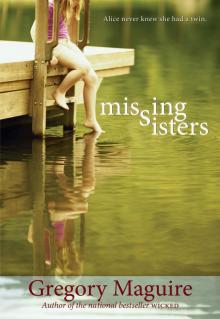 Missing Sisters
Missing Sisters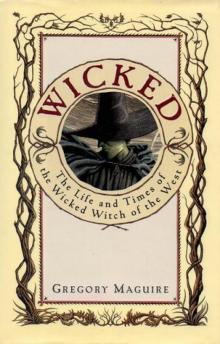 Wicked: The Life and Times of the Wicked Witch of the West
Wicked: The Life and Times of the Wicked Witch of the West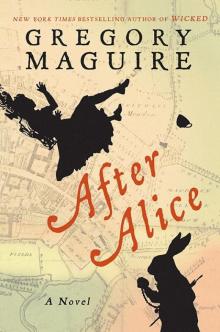 After Alice
After Alice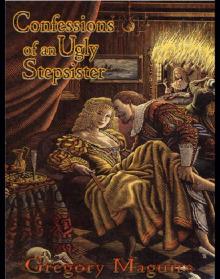 Confessions of an Ugly Stepsister
Confessions of an Ugly Stepsister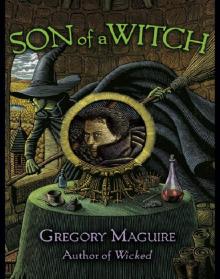 Son of a Witch
Son of a Witch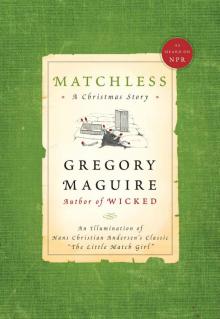 Matchless
Matchless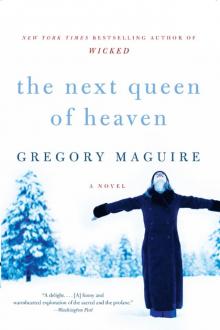 The Next Queen of Heaven
The Next Queen of Heaven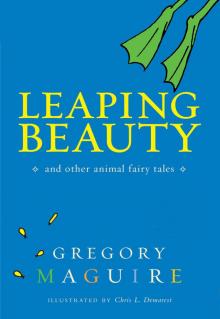 Leaping Beauty: And Other Animal Fairy Tales
Leaping Beauty: And Other Animal Fairy Tales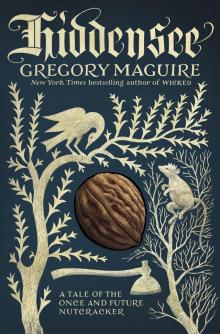 Hiddensee: A Tale of the Once and Future Nutcracker
Hiddensee: A Tale of the Once and Future Nutcracker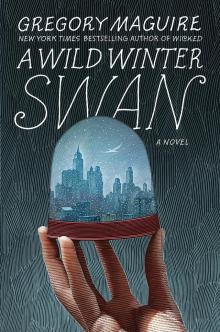 A Wild Winter Swan
A Wild Winter Swan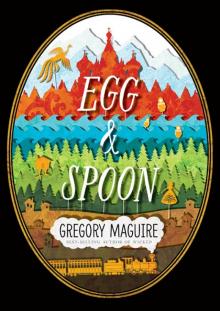 Egg & Spoon
Egg & Spoon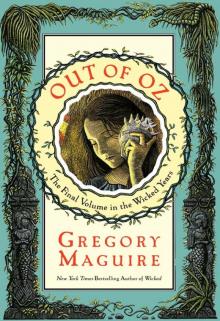 Out of Oz
Out of Oz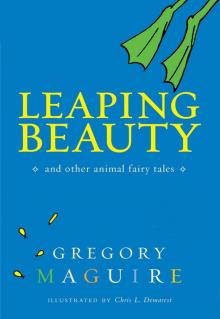 Leaping Beauty
Leaping Beauty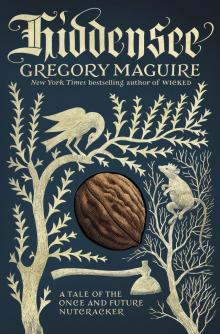 Hiddensee
Hiddensee The Wicked Years Complete Collection
The Wicked Years Complete Collection The Next Queen of Heaven: A Novel
The Next Queen of Heaven: A Novel